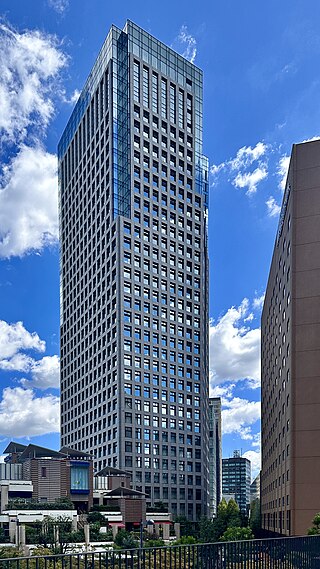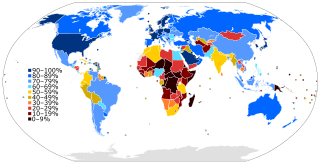
Telecommunications in Ghana include radio, television, fixed and mobile telephones, and the Internet.
India's telecommunication network is the second largest in the world by number of telephone users with 1179.49 million subscribers as on 31 January 2021. It has one of the lowest call tariffs in the world enabled by mega telecom operators and hyper-competition among them. India has the world's second-largest Internet user-base with 747.41 million broadband internet subscribers.
Telecommunications in the Philippines are well-developed due to the presence of modern infrastructure facilities. The industry was deregulated in 1995 when President Fidel Ramos signed Republic Act No. 7925. This law opened the sector to more private players and improved the provision of telecom services are better and fairer rates, leading to the creation of many telecommunication service providers for mobile, fixed-line, Internet and other services.

The telecommunication infrastructure of Singapore spans the entire city-state. Its development level is high, with close accessibility to the infrastructure from nearly all inhabited parts of the island and for all of the population, with exceptions. Today, the country is considered an international telecommunications hub, an achievement that was driven by Singapore's view that high-quality telecommunications is one of the critical factors that support its economic growth.

Communications in Somalia encompasses the communications services and capacity of Somalia. Telecommunications, internet, radio, print, television and postal services in the nation are largely concentrated in the private sector. Several of the telecom firms have begun expanding their activities abroad. The federal government operates two official radio and television networks, which exist alongside a number of private and foreign stations. Print media in the country is also progressively giving way to news radio stations and online portals, as internet connectivity and access increases. In 2012, a National Communications Act was also approved by Cabinet members, and 2 October 2017, the president of Somalia Finally signed the National Communications Law, and became the official Law that regulated the ICT industry. Under that Law, National Communications Authority (NCA) of the federal Republic of Somalia has been established, with board of directors and a general manager. Somalia currently is ranked first in Africa for most affordable mobile data per gigabyte and 7th in the world.

Telecommunications infrastructure in South Africa provides modern and efficient service to urban areas, including cellular and internet services. The Independent Communications Authority of South Africa (ICASA) is the watchdog of the telecommunications in the country.
The liberalization of Bangladesh's telecommunications sector began with small steps in 1989 with the issuance of a license to a private operator for the provision of inter alia cellular mobile services to compete with Bangladesh Telegraph and Telephone Board (BTTB), the previous monopoly provider of telecommunications services within Bangladesh. Significant changes in the number of fixed and mobile services deployed in Bangladesh occurred in the late 1990s and the number of services in operation has subsequently grown exponentially in the past five years.

KDDI Corporation is a Japanese telecommunications operator. It was established in 2000 through the merger of DDI, KDD (ケイディディ), and IDO. In 2001, it merged with a subsidiary named Au, which was formed through the merger of seven automotive and mobile phone companies from the DDI-Cellular Group. As of 2020, it is the second-largest mobile telecommunications provider in Japan in terms of the number of contracts, following NTT Docomo.

Swisscom AG is a major telecommunications provider in Switzerland. Its headquarters are located in Worblaufen near Bern. The Swiss government owns 51 percent of Swisscom AG. According to its own published data, Swisscom holds a market share of 56% for mobile, 50% for broadband and 37% for TV telecommunication in Switzerland. Its Italian subsidiary Fastweb is attributed 16% of private clients and 29% of corporate clients share of Italian broadband and is also active in the mobile market.

Emirates Telecommunications Group Company PJSC, doing business as etisalat by e& is an Emirati-based multinational telecommunications services provider, currently operating in 16 countries across Asia, the Middle East, and Africa. It is the 18th largest mobile network operator in the world by number of subscribers. In December 2020, Etisalat claimed to provide the world's fastest 5G download speed at 9.1 Gigabits per second, a network that has started rolling out in Dubai since 2017. Etisalat is one of the strongest brands in the Middle East and Africa and one of the strongest telecoms brand in the world.

StarHub Limited, commonly known as Starhub, is a Singaporean multinational telecommunications conglomerate and one of the major telcos operating in the country. Founded in 1998, it is listed on the Singapore Exchange (SGX).
Ooredoo QSC is a Qatari multinational telecommunications company headquartered in Doha. Ooredoo provides mobile, wireless, wire line, and content services with market share in domestic and international telecommunication markets, and in business and residential markets.

The Economy of Somaliland largely relies on primary production and agriculture, where livestock is the main export of the country, which it ships to neighbouring Djibouti and Ethiopia, as well as to Gulf states, such as UAE, Saudi Arabia and Oman. Somaliland has a GDP per capita of $1500 and a gross domestic product GDP of $7,156,781,627 as of 2022, most of which it receives in remittances from Somalis working abroad. The COVID-19 pandemic has restricted Somaliland's trade flows with decreased demand in the agriculture sector, a significant source of tax revenue.
The Universal Service Fund (USF) is a system of telecommunications subsidies and fees managed by the United States Federal Communications Commission (FCC) intended to promote universal access to telecommunications services in the United States. The FCC established the fund in 1997 in compliance with the Telecommunications Act of 1996. The FCC is a government agency that implements and enforces telecommunications regulations across the U.S. and its territories. The Universal Service Fund's budget ranges from $5–8 billion per year depending on the needs of the telecommunications providers. These needs include the cost to maintain the hardware needed for their services and the services themselves. The total 2019 proposed budget for the USF was $8.4 billion. The budget is revised quarterly allowing the service providers to accurately estimate their costs. As of 2019, roughly 60% of the USF budget was put towards “high-cost” areas, 19% went to libraries and schools, 13% was for low income areas, and 8% was for rural health care. In 2019 the rate for the USF budget was 24.4% of a telecom company's interstate and international end-user revenues.

Telecommunications in Somaliland, an internationally unrecognised republic claimed by Somalia, are mainly concentrated in the private sector. A number of local telecommunications firms operate in the region, including Golis Telecom Somalia, SomCable, Somtel and Telesom.

The Internet in Africa is limited by a lower penetration rate when compared to the rest of the world. Measurable parameters such as the number of ISP subscriptions, overall number of hosts, IXP-traffic, and overall available bandwidth are indicators that Africa is far behind the "digital divide". Moreover, Africa itself exhibits an inner digital divide, with most Internet activity and infrastructure concentrated in South Africa, Morocco, Egypt as well as smaller economies like Mauritius and Seychelles. In general, only 24.4% of the African population have access to the Internet, as of 2018. Only 0.4% of the African population has a fixed-broadband subscription. The majority of internet users use it through mobile broadband.

Vodacom Tanzania Limited is Tanzania's leading cellular network company. As of December 2020, Vodacom Tanzania had over 15.6 million customers and was the largest wireless telecommunications network in Tanzania. Vodacom Tanzania is the second telecom company in Africa, after Vodacom, to switch on its 3G High-Speed Downlink Packet Access (HSDPA) which was available only in Dar Es Salaam in early 2007.
Like many developed and developing countries, the Internet in Bangladesh has witnessed significant growth. Although facing many constraints in expanding Internet access and use, development of the Internet and Information Technology are high government priorities. In March, 2021 Internet users in Bangladesh increased to 116 million. On 19 February 2018, Bangladesh started the 4G network service.

Tigo is a telecommunication company in Tanzania.

Hormuud Telecom Somalia Inc. is a privately held telecommunications company based in Mogadishu, Somalia. It is the largest telecommunication company and largest private-sector employer in the country, and also Somalia's first private enterprise to be internationally ISO certified.













